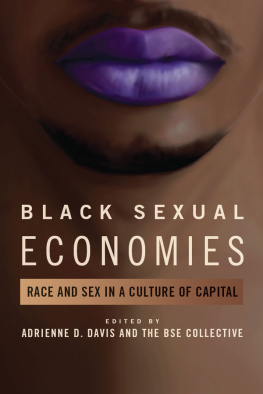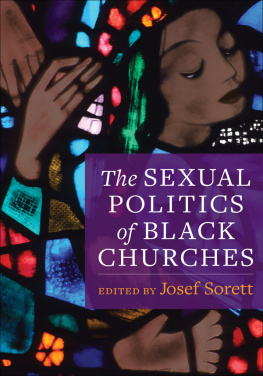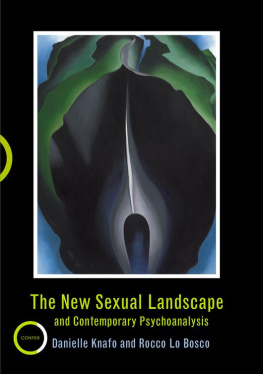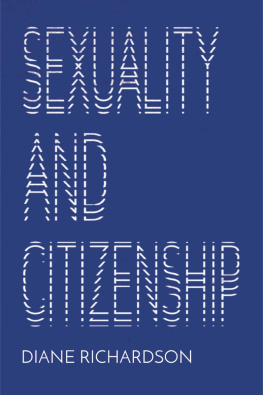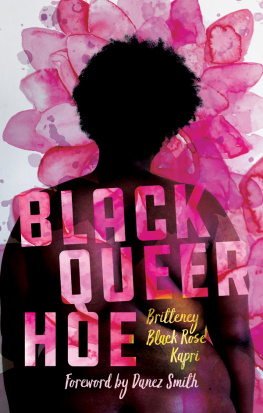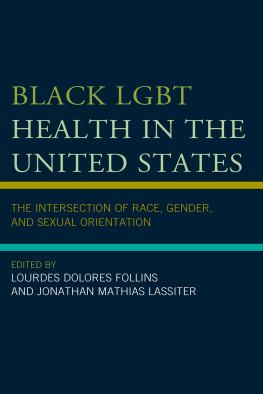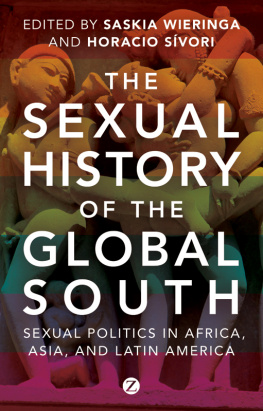Acknowledgments
The Black Sexual Economies (BSE) Collective is grateful for the extraordinary support we received from numerous agencies, divisions, campuses, mentors, artists, and activists in the process of establishing the collective and bringing this collection to fruition. Our collective began as a working group of eight scholars from seven US research universities working in the fields of law; African American and African diaspora studies; English; women's, gender, and sexuality studies; film and media studies; history; American studies; and the performing arts. The goal of the Black Sexual Economies Collective was to be an incubator for the crafting of new paradigms for thinking about race, gender, sexuality, and class and the use of innovative interdisciplinary methodologies. This collection of essays, Black Sexual Economies: Race and Sex in a Culture of Capital, which emerges from the BSE scholarly research project workshops and a larger community of scholars with whom we have collaborated, demonstrates the power of boundary-transgressing research exchanges to spotlight cutting-edge thinking at the forefront of black sexualities studies.
It was Adrienne D. Davis, William M. Van Cleve Professor of Law and vice provost at Washington University School of Law in St. Louis, a leading black feminist legal scholar, who laid the foundation both for the emergence of our research collaboration and for the theoretical architecture we have constructed around her concept of black sexual economy. Her intellectual rigor is matched by her creative vision of possibility, her indefatigable leadership, and her infinite generosity. In St. Louis she fed bellies, intellect, and creativity. We remain in awe of her talent and commitment to scholarship and to black feminist praxis. Adrienne, we thank you for your pioneering thinking and visionary support. We are simply the backup singers, the Davisetts.
We wish to thank Marion Crain, the Wiley B. Rutledge Professor of Law and past director of the Center for the Interdisciplinary Study of Work and Social Capital at Washington University School of Law, for awarding us the grant to create the BSE Collective and meet regularly on the WU campus for four years (201013). The center was also instrumental in organizing and hosting our 2013 international conference, Black Sexual Economies: Transforming Black Sexualities Research. We thank the superlative administrative staff of Washington University School of Law, especially Gail Boker and Shelly Henderson Ford, for making the workshop and conference a success.
We offer thanks and appreciation to Cathy Cohen, Jennifer DeVere Brody, E. Patrick Johnson, Dwight McBride, Rinaldo Walcott, Darieck Scott, and Tricia Rose, senior scholars who generously anointed our conference with black scholar magic and provided invaluable engagement and feedback on our papers, which were the foundation for the essays in this book. We also thank all the participants of the conference who do not appear in the book but were crucial in shaping it and are crucially shaping the field of black sexualities studies, including Aliyya Abdur-Rahman, Juan Battle, Nicola Beisel, Bonnie Bright, Darrias Carter, Alix Chapman, Tabitha Chester, Cecilio Cooper, Shea Dunham, Erica Edwards, Jordache Ellapen, Asha French, Kai Green, LaNita Gregory Campbell, Henry Hamilton, Jillian Hernandez, Amanda Hobson, Kwame Holmes, Zakiyya Iman Jackson, Jennifer Jones, Sara Clarke Kaplan, Rosamond S. King, Jennifer Leath, Jared Leighton, Shannon Miller, Marlon Moore, Amber Jamilla Musser, Jennifer Nash, Ianna Owen, Emily Alyssa Owens, Alison Reed, Quincey James Rinehart, Jasmine Salters, Tanya Saunders, Sami Schalk, Kai Small, Christopher Smith, Sarah Smith, Ciann Wilson, and Tsione Wolde-Michael. We are grateful for your intellectual innovations and community.
We wish to thank Jean-Paul Rocchi and our colleagues at the Collegium for African American Research (CAAR) for the international venue in which we first presented our collective ideas, the historic 2011 conference, Black States of Desire: Dispossession, Circulation, Transformation, at the University of Paris DiderotParis 7. The support, enthusiasm, and critical engagement of our European colleagues specializing in black cultural studies were amazingly generative and truly appreciated.
A number of students supported the creation of this book, working as research assistants and editors, and we would like to thank Rony Eduardo Castellanos, Ursula Chan, Kimberly Coffman, Rogelia Mata, and Teddy Pozo for their superlative work on the manuscript. Allison Pierce and Jordan Victorian, thank you for your indispensable research, editing, and indexing labor, and we are grateful to Megan Spencer for her gorgeous cover art for this book. The University of California, Santa Barbara, Academic Senate kindly provided support for research assistance, editing, and publishing subvention. We count ourselves lucky to have worked with Dawn Durante and her team at the University of Illinois Press. Thank you, Dawn, for your support of our vision for this collection and your steady hand in navigating the process.
Finally, we thank our scholarly networks and universities for championing not only black intellectual production but also the process of its formation. Creating the conditions that enable the development of critical analyses, mentorship opportunities, and intellectual collaborations has been vital for our individual success and productivity. This support in turn enabled us to create a critical discourse and opportunities for black emerging and senior scholars in various fields to engage and learn from one another, continuing the black radical tradition by way of powerfully and unapologetically inserting sex and sexuality into the discussion. We continue to work to develop black public and intellectual spaces informed by radical and queer and black epistemologies and practices, as well as methodologies that center, give voice to, and work in coalition with black sexual minorities and gender-nonconforming people. We endeavor to continue this work and to support future generations of emerging scholars doing this risky yet necessary scholarship, and we hope that more universities and funding agencies will invest in the future of black scholarship.
The New Black Studies Series
Beyond Bondage: Free Women of Color in the AmericasEdited by David Barry Gaspar and Darlene Clark Hine
The Early Black History Movement, Carter G. Woodson, and Lorenzo Johnston GreenePero Gaglo Dagbovie
Baad Bitches and Sassy Supermamas: Black Power Action FilmsStephane Dunn
Black Maverick: T. R. M. Howard's Fight for Civil Rights and Economic PowerDavid T. Beito and Linda Royster Beito
Beyond the Black Lady: Sexuality and the New African American Middle ClassLisa B. Thompson
Extending the Diaspora: New Histories of Black PeopleDawne Y. Curry, Eric D. Duke, and Marshanda A. Smith
Activist Sentiments: Reading Black Women in the Nineteenth CenturyP. Gabrielle Foreman
Black Europe and the African DiasporaEdited by Darlene Clark Hine, Trica Danielle Keaton, and Stephen Small
Freeing Charles: The Struggle to Free a Slave on the Eve of the Civil WarScott Christianson
African American History ReconsideredPero Gaglo Dagbovie
Freud Upside Down: African American Literature and Psychoanalytic CultureBadia Sahar Ahad
A. Philip Randolph and the Struggle for Civil RightsCornelius L. Bynum
Queer Pollen: White Seduction, Black Male Homosexuality, and the CinematicDavid A. Gerstner
The Rise of Chicago's Black Metropolis, 19201929Christopher Robert Reed
Living with Lynching: African American Lynching Plays, Performance, and Citizenship, 18901930Koritha Mitchell
Africans to Spanish America: Expanding the Diaspora
Next page
